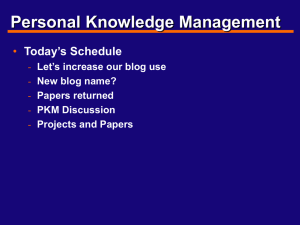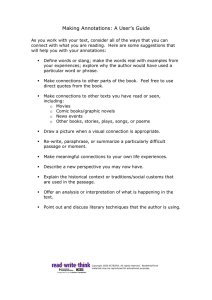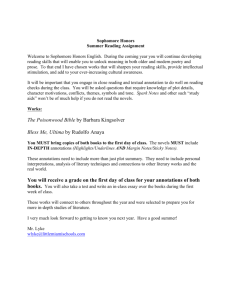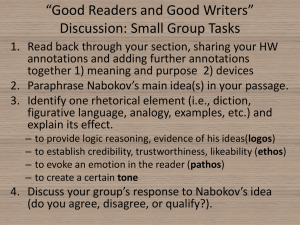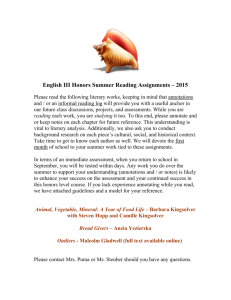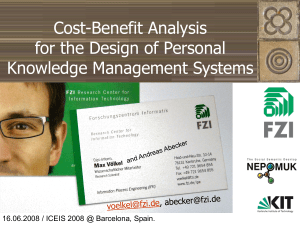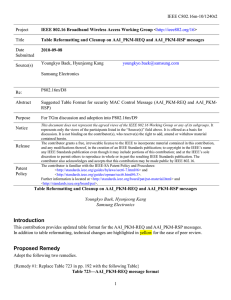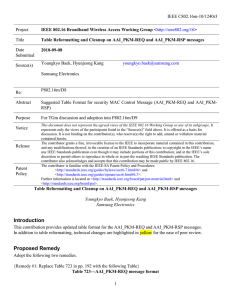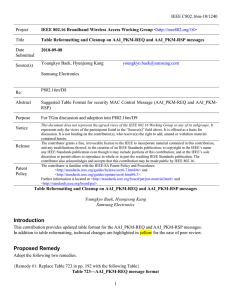Personal Knowledge Management
advertisement
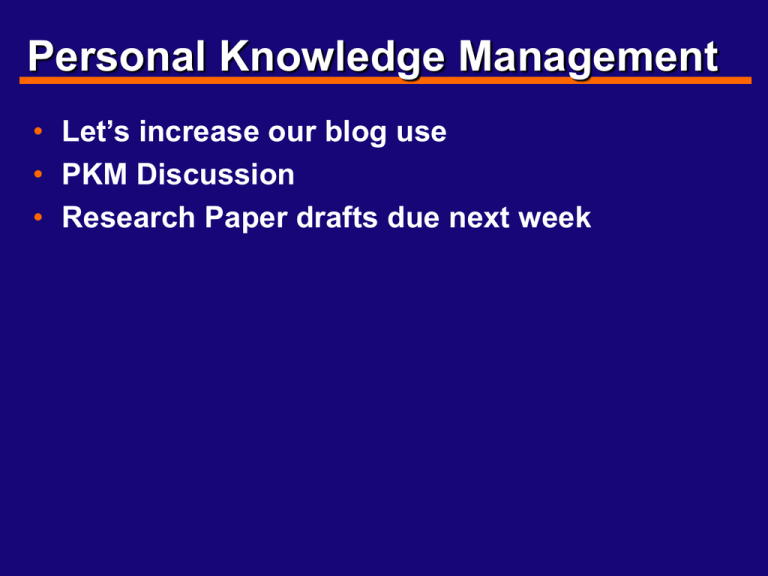
Personal Knowledge Management • Let’s increase our blog use • PKM Discussion • Research Paper drafts due next week Blogging • Everyone should be using the blog more - Class participation grade - General sharing of ideas & resources - External memory or reminder for sources later • Using a feed reader is key (it seems) • Keep ideas/posts in a text file, then log on & upload • Features on the blog - Learn how WordPress works - read the docs - Suggest any changes to our configuration, topics or interface What do you use for PKM? • Not just information management, but knowledge management - Digital Files, but with annotations - Paper Documents, but with handwritten notes - Journal entries, class notes, ideas, lists • Adding your thoughts & ideas to external information sources • Metadata about notes (when, who, why) - Something, someplace, some object(s) that you refer back to, rely on for reference, use to pick up old work again or to remind yourself of ideas? • Do you add value to your information? • How does the Web or any IT system(s) you use fit into a PKM process? As We May Think • Set of ideas based on research areas at that time: - The value of sharing information (science) • Stored, extended, consulted - Peer review (by inclusion & commentary) • How far thinking was it? - What technologies we have now are in the memex? - Dynamic access is proposed (over sequential) • Indexing & aliasing - Less time formatting & distributing, more time learning & sharing • Information use becomes (more about) multitasking • It’s about Associations - Joining items, trails, comments for personal context, full notes What’s missing in Memex? • Collaboration • Updating dynamic information (links) - Encyclopedias, Patents are acknowledged, but no mechanism is designed out • Speed is relative - In learning, annotating & retrieval • Personal interfaces - Eyes & ears, but not mechanisms • Is this how knowledge workers work now? - Complex civilization - Records My Life Bits • Updating Memex • Aggregated collections • Searching functionality - Query by Story, Story by Query? - Drag and drop = “more like this”? • Advanced visualization? - Too much of a good thing? - Understanding viz & info at once? • My annotations, your annotations, our annotations PIKII • • • • Web-enabled, knowledge manager Uses standard formats and protocols Builds on hypertext theory Works with new internet-based info formats - RSS, XML, XML-RPC, URIs, Trackbacks • Can weblogs be adapted for other functions such as PIM and PKM? - How can you share with levels of security & privacy? - Local (personal) & Global (organizational) • Creation, retrieval & sharing all in the same interface PIKII & Hypertext • Nodes: - Encapsulated units of content in any MIME type format identifiable by W3C compliant protocols and data structures. • Transclusion: - XML RSS based syndication distributes content anywhere • Link types: - Static & dynamic URIs for tracking & addressing comments; posts & news with time/date stamps; & associative properties identifiable using info retrieval methods. • Backlinks: - Trackback & HTTP-referrer linking provides bi-directional links. • Annotation: - A core attribute of many blog posts & the syndication format is a link, often directly connectable to a parent node. Is PIKII already here? • All operating systems since 2001 include Web servers • Broadband keeps up connection (almost) continuously • Blogs, Wikis, Semantic Web tools & Web 2.0 • Desktop search & Web search - Personalized interfaces - Portals (but no annotations) • Group, collaborative tools vs. Personal tools • Open formats, open extensions, strong networked infrastructure (URIs), MIME types PIKII Pickiness • Does the average knowledge worker become a Web developer? • Is is better to have a networked, distributed system with personalization than your own server? - Are your works individual enough to be shared? - What would you NOT want to share with others? • Is doing everything in the same interface a good design? • Reading vs. Participating? • Tagging vs. Annotating? Stuff I’ve Seen • Is there a difference between local and global information (storage & access)? • All in one interface or distributed per application or function? • One, big index or many smaller ones? • What are the best contextual cues? - Link colors - History views - Piles and timelines? Finding files & extending history • What if everything was tracked with history? • How would navigation change among information & documents? • How would recalls and reminding work? Other systems, other devices? • Haystack • Dashboard • Mobile devices - MS digital camera recordings - PDAphones - Wearable computing How do knowledge workers work? • On the Web? - Too big to keep in memory - Tools, tasks & conventions are used to help • Too much of a good thing? - Never stop researching & (re)finding - Everything or just a few things? KM Activities • • • • • • Finding Information gathering Browsing Transacting Communicating Housekeeping • You: most or least? • Web only? Mostly on the Web? QuickTime™ and a TIFF (LZW) decompressor are needed to see this picture. KM Web Activities spectrum • • • • • • • • • How did you initiate this activity? Was it a work or non-work activity? Was there a goal? (If yes, did you achieve it?) Was there a specific question (and if so what was it)? Was the activity initiated, executed and completed in one sitting, or was it spread out over time? Was this a routine activity or unique event? Was there any collaborative aspect to the activity? Was anything printed out? What were the good or bad aspects of the way the Web supported this activity? Using Web browsers for PKM • Bookmarks, history, link colors, toolbars • Browser add ons - Firefox extensions - Toolbars - RSS readers • How can a browser support these tasks? - Should it? - It could be better • Manage old, duplicate and updated links • Show pages in context (& support annotations) Kaasten & Greenberg’s system • • • • • • See the page thumbnail Filters Sliders for features Marking (dog ears) Color “Domain” - grouping QuickTime™ and a TIFF (LZW) decompressor are needed to see this picture. Research Paper - A scholarly work, approximately 17 pages in length (no more than 20, including bibliography), that could be suitable for publication. - Papers might discuss: • Historical review of the topic, including origin, inspirations and intentions • Evolution of a KMS topic (a system, a phenomenon, a setting) and its application to Knowledge Management • Review of current state of the art for this topic and its relation to KMS (in relation to our course readings) Research Paper Content • Impact of the KMS technology in use and possible changes in: - knowledge work - organizational architecture - management - collaboration - communication - trust - privacy - reputation • Future of the KMS technology including lifecycle, new developments and integration with other technologies - Adoption - Use
